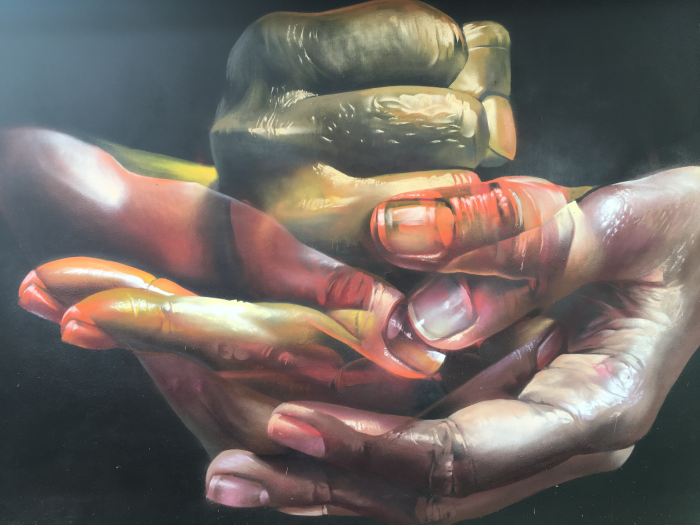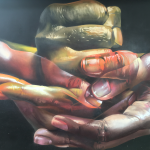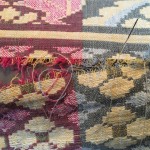On MLK Day, I’m Golden.
I didn’t think about being brown, a minority, a brown woman, a brown Muslim woman and all the minorities that description contains, for a long time. I’m not sure when or where the idea of race and identity hit me or why. I always knew I was different as the only other Indians and Muslims in my community were my family. Growing up in suburban Chicago, in my particular suburb, there was actual diversity in race, ethnicity, and economics, though many times I’m not sure I noticed it all. This has to do, perhaps, with my own naivety, and being sort of “color blind” myself; thinking that I wasn’t really different than anyone else.
Of course, as you grow older and have more bumps and bruises from running into different types of people and points of view, your opinions and realizations change. I think about my identity more now than ever. This is partially because the present narratives around various parts of my identity are not constructed by me, are not imagined with language I would use, nor contain images that resonate with my own sense of self. But more than my own perception of self, I am more acutely aware of it because I have two children who are mixed race and Muslim. How I identify in this world and how my children will as they grow up I know will be distinctive. The narratives of race and religion today are different than in the 80’s when I perceived that no one seemed to care.
Around Martin Luther King (MLK) day a few years ago, my son just seven and my daughter four were sitting at the kitchen table for dinner. They sat and ate their dinner and I was standing at the kitchen sink cleaning. This was the conversation—my first as a parent—being questioned about race and identity.
Son: Mom, do you remember that really bad time in America.
Me: Ummm … the Civil War?
Son: No … you know that other time?
Me: Oh, you mean World War I or World War II. Those were really bad.
Son: No, that REALLY bad time.
Me: (To be honest, I was wondering what he was talking about, to me, the Bush era over, it could have been many times since his birth … I was sort of lost.) … Umm, there might have been a lot of bad times, what are you thinking of?
Son: You know, the “S” time.
Me: The “S” Time?
Son: You know … (and he looked down, embarrassed and shy) … Segregation. That REALLY BAD time.
Me: Oh, yes, that was a really bad time…
And the real question came that left me almost speechless.
Son: Mom, if we (me and my sister) were with you, would we have to sit at the back of the bus?
When your seven year old asks if he were born at a different time to a brown mother and white father and would he have to sit at the back of the bus, well, it takes a minute think of the right response. Though, there is really only one answer.
Me: Yes.
The tension somewhat relieved from the room, the conversation continued.
Son: Well, that doesn’t really seem right. You know … to make people sit at the back of the bus because you’re a different color.
Me: You’re right, that isn’t right. And there were many people who stood up to make sure things like that and separate places to eat and work didn’t happen; you know things like your Dad and I getting married, that wouldn’t happen during segregation. Though we may have gotten married anyway but maybe been arrested. Which, also isn’t so good.
Son: Yeah, like Rosa Parks, she didn’t sit at the back of the bus. But we would have to because we’re your kids and you’re brown.
Me: Yes, if we were all together, and even if you weren’t with me, yes, you’d have to sit at the back of the bus, because you’re brown too.
At this point, my daughter, quietly listening, but being only four wasn’t really part of the conversation, just stood up on her chair and said:
Daughter: Me, not me. I’m not sitting at the back of any bus, I’m Golden.
I was surprised at her own self-assurance and conviction of her point of view, place and ability to self identify. Golden she was. They will learn, as they grow up in a world where they may have more (or perhaps fewer) challenges than I did, how they define their own identities and how the world crafts narratives around who they are. But, for now, I’m thrilled that they are not willing to sit at the back of the bus. We are fortunate and indebted in a million ways to people who had more grace and courage than us, to forge the path that allows us to feel Golden. I hope we can do the same for those that come.
So wishing that today and always, you and I have the presence to know ourselves and the voice to say “I’m not sitting at the back of any bus. I’m Golden” with heart and conviction whatever type of bus bearing oppression and hardship we may have to ride.
Peace be with you all on a day dedicated to a Peacemaker.
Photo: KSRazvi November 2015, Wynwood Walls, mural by CASE









Leave a Reply